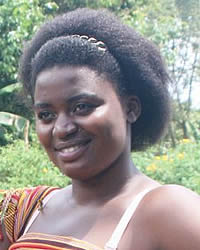Somali Bantu in United States

Photo Source:
Emmanuel Adiba - Wikimedia
Creative Commons
|
Send Joshua Project a map of this people group.
|
| People Name: | Somali Bantu |
| Country: | United States |
| 10/40 Window: | No |
| Population: | 54,000 |
| World Population: | 1,129,400 |
| Primary Language: | Maay |
| Primary Religion: | Islam |
| Christian Adherents: | 0.05 % |
| Evangelicals: | 0.02 % |
| Scripture: | Portions |
| Ministry Resources: | No |
| Jesus Film: | Yes |
| Audio Recordings: | Yes |
| People Cluster: | Bantu, Swahili |
| Affinity Bloc: | Sub-Saharan Peoples |
| Progress Level: |
|
Introduction / History
The Somali Bantu are a group of Black African communities in Southern Somalia, where they also call themselves Jareer Weyne. They are united by their second-class status within Somali Society and by the racial discrimination and persecution they have faced there. In the 1990s, many thousand Somali Bantu fled the civil war in Somalia and became refugees in neighboring Kenya. In the early 2000s, the United States government approved the mass resettlement of 12,000-14,000 Somali Bantu refugees. In the process, many families were torn apart, which means that most Somali Bantus in the United States have relatives in Kenya and in Somalia.
Over 20 years have passed since the majority of Somali Bantus arrived in the United States, and an entire generation has grown up without any experience of Africa. This has led to massive shifts in Somali Bantu culture and way of life. However, due to family reunifications and further refugee resettlement, new Somali Bantus have arrived in the United States every year. That means some community members are still struggling to adjust, while others are completely American.
Initially, Somali Bantu refugees arriving in the United States were spread out across many States. Over time, many have moved to a hand full of key cities to form more of a larger community. The largest Somali Bantu community estimated at over 5,000-10,000 people is located in Columbus, OH. Other significant groups are located in Buffalo and Syracuse, NY, Pittsburgh and Erie, PA, Louisville, KY, Wisconsin, Lewiston, ME, Seattle, WA, and Utah.
In most of these cities, Somai Bantu ended up in low-income neighborhoods with poor education and high crime rates. This experience has shaped the community in significant ways.
What Are Their Lives Like?
Most Somali Bantu had never lived in a modern city before coming to the United States and had great difficulties adjusting. Many didn't have any formal education or transferable job skills. Among the older generation, some still struggle with speaking English and many depend on social services for their livelihood.
The younger generation of Somali Bantu has adjusted well to life in America, but in many cases they got stuck in bad neighborhoods with few educational or economic opportunities. Many young Somali Bantu have been affected by drugs and street gangs, and especially in Columbus, OH, some Somali Bantu youth have formed their own gang. There are some young Somali Bantu, however, who have been able to get college degrees, better jobs, and start non-profit organizations to help and support their community.
Many Somali Bantu are still closely connected to relatives in Kenya and Somalia. Some have traveled back to visit family or to find a spouse in Africa, others to invest in Kenya for their retirement.
What Are Their Beliefs?
Almost all Somali Bantu are Sunni Muslims, and many adhere to strict Islamic dress code and behavior norms. However, most Somali Bantu have very little knowledge of Islam and the teachings in the Koran. Among the older generation, many believe in or even practice witchcraft and spirit possession cults. Among the younger generation, many are secularized.
A very small number of older Somali Bantu adopted Christianity in Somalia in the 1960s and 1970s, when Catholic and Mennonite missionaries served in their area. Most of them did not pass on their faith to their children. Today, there are only a handful of known Somali Bantu Evangelical believers.
What Are Their Needs?
Many older Somali Bantu in the United States feel that their children are losing their ethnic identity and culture and are taking on the worst of the American way of life. On the one hand, they need support in preserving the best of their cultural heritage and organizing themselves around their common identity. On the other hand, they need youth programs to help their children get out of gang life.
As some Somali Bantu have only arrived in the United States in the last years, there is also a continuing need for refugee services, especially in areas of English language, literacy, and job skills.
Most of all, Somali Bantu need access to the gospel in a contextualized way, with resources in their heart languages.
Prayer Points
Pray for isolated Somali Bantu believers to be strengthened in their faith and to connect with one another to form a believing community across states and continents.
Pray for Bible stories and other gospel resources to be translated and contextualized for the Somali Bantu community.
Pray for American believers to welcome Somali Bantu into their own lives, and who are able to enter Somali Bantu communities with cultural sensitivity.
Pray for God to open doors through this relational ministry for Somali Bantu to hear the good news and start to follow Jesus.